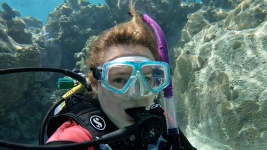

Soren Schipper
s.schipper@aims.gov.au
PhD
Australian Rivers Institute

Soren Schipper
s.schipper@aims.gov.au
PhD
Australian Rivers Institute
House hunting on the Great Barrier Reef; What do prospective coral recruits seek in their algal dream homes?
Soren (she/her/hers) is from the United States but lived in Vancouver, Canada for four years before moving to Australia to attend Griffith University. Soren’s MSc research involved collecting, sequencing, and running phylogenetic analyses on geniculate coralline algae from the Northeast Pacific for comparison with DNA from type specimens, (including one collected from Chile in the 1800s by Charles Darwin) for the purpose of accurate name application, range confirmation, and characterization of the population growing in British Columbia, Canada. She’s excited about applying her knowledge of coralline phylogenetics and morphology to facilitate coral recruitment onto crustose coralline algae for the Reef Restoration and Adaptation Program (RRAP) at the Australian Institute of Marine Science.
House hunting on the Great Barrier Reef; What do prospective coral recruits seek in their algal dream homes?
2022 to 2025
Project Description
This project investigates the phylogeny, ecology, biology, and chemistry of crustose coralline algae that are critical for coral settlement on the Great Barrier Reef.
Project Importance
Coral reefs worldwide are threatened by increased temperatures, pollution, and other anthropogenic stressors. In order to reduce coral decline, quick and strategic intervention is required. One strategy for restoring degraded reef is via sexual propagation which involves inducing coral larvae to settle in the laboratory and planting seeded devices onto reefs. Crustose coralline algae (CCA) are a critical component of this process, but not all CCAs are the same. Corals have shown strong preferences for some CCA species over others, and little is known about these important algae. This research seeks to fill in knowledge gaps surrounding the phylogeny, ecology, biology and chemistry of some highly inductive CCA.
Project Methods
DNA will be extracted from unknown CCA specimens for comparison in multi-gene phylogenetic analyses and for comparison with type specimens to determine species boundaries and confirm name application. Target species of interest will be collected from the reef and observed in aquaria to determine optimal conditions for growth and propagation, and manipulative experiments will be conducted to determine the impact of light on CCA community composition and morphology. Fresh material will be chipped from rock for chemical extraction, fractioning, and analysis to determine which chemical or chemical groups in the living surface of the CCA are responsible for coral larval induction. Bioactivity will be tested on live larvae via settlement assay during coral spawning.
Project Results
This project will fill in the knowledge gaps surrounding the phylogeny, ecology, biology, and chemical composition of highly inductive CCA. Species specific knowledge of optimal growing conditions, life history requirements, and inductive chemistry may be applied to maintaining successful CCA monoculture and upscaling coral settlement in the laboratory for the purpose of restoring reefs.
Keywords
Algae,
Aquaculture,
Biodiscovery,
Coral reefs,
Corals,
Ecology,
Genetics,
Interaction,
Natural products chemistry,
Taxonomy
Supervised By:
Muhammad Abdul Wahab (JCU)
Guillermo Diaz-Pulido (Griffith University)